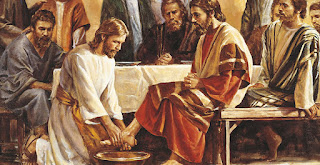Every languague uses different body parts to symbolize things. Some of these are common across many languages, and others are different from one culture to another. Hebrew has its own set, and I will discuss them as I come across them in my studies.
The first one I came across was knees. In English we may say someone goes "weak in the knees" to indicate they are so overcome with emotions that they might faint. Recently "To take a knee" has meant someone decides to respectfully not show respect for something.
In Hebrew, the knee is related to blessing. The word to for "to kneel" is the same as to bless, baruch רךבּ
That is why, in Hebrew, the Lord can bless us, as in the Priestly Blessing in Number 6:23
May the Lord bless you and keep you...
And we can "bless" the Lord, as in Psalm 103:1
Bless the Lord, oh my soul...
In both passages the word "bless" is a form of the same word, רךבּ
One might ask, how can we as mere mortals "bless" the Lord? We can't really do anything to give him something he doesn't already have. But if we understand that "bless" means "kneel before" that makes sense.
But wait? Does it make sense that the Lord would then kneel before us? I don't know how Jewish people feel about this idea, but as members of the Church of Jesus Christ of Latter-day Saints, we know that the Lord, who is יהוה Yaweh, (see my blog post on the tetragramton) is the same as Jesus. Was there any time that he knelt before his followers? Yes! He knelt when he washed the disciples feet, and when he prayed for the children at Bountiful in the Book of Mormon. In the Garden of Gethsemane, he didn't kneel, but was so overcome he lay prostrate, face down, on the ground.
If יהוה who created the earth and is our Savior, was willing to kneel for us, shouldn't we be all the more willing to kneel before him?




